- Author Antonio Harrison [email protected].
- Public 2023-12-16 07:44.
- Last modified 2025-01-22 21:44.
Poet, storyteller, collector of Kazakh folklore Muzafar Alimbaev is known not only in his homeland. His poetry has been translated into 18 languages. The creativity of the poet and writer is interesting not only for adult readers, but also for kids. For them, the venerable author wrote many fascinating stories and fairy tales.
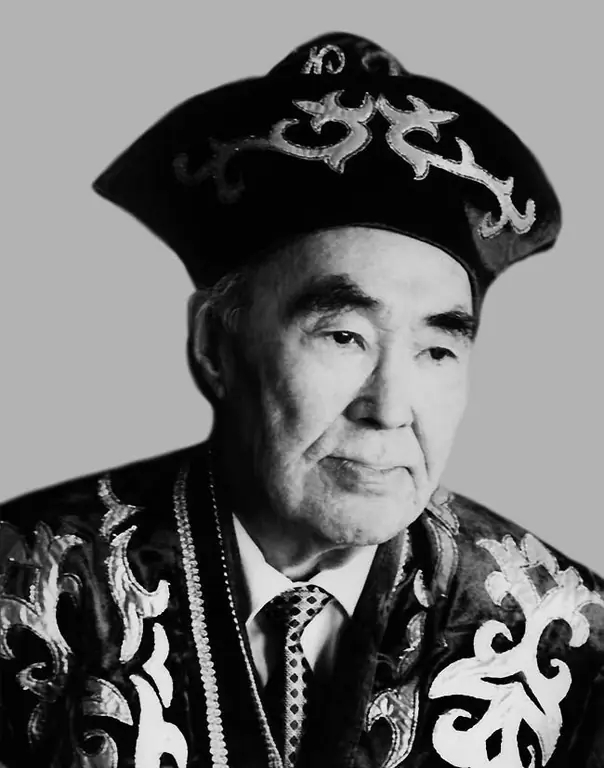
Biography of Muzafar Alimbaev
In the picturesque region, where fresh lakes and streams are stretched like a necklace, connected by islets overgrown with bushes, there is the Maraldy salt lake. Not far from the relict reservoir there is a village where the great Kazakh poet and thinker Muzafar Alimbaev was born. His birth took place in 1923 on October 19. The father gave his son the name "Muzafar", it is translated from Arabic as "winner". The boy grew up among beautiful nature, surrounded by the love and care of his parents.
His mother had a huge influence on the future poet. She perfectly knew Kazakh folk poems and was interested in literature. It was the lessons that the mother gave her son that introduced little Muzafar to the work of the Kazakh akyn Abay. When fellow villagers made trips to the city, Muzafar's mother always asked them to bring books. These were small editions of Tolstoy's fairy tales, poems by Lermontov and Pushkin, brochures in Arabic. Muzafar Alimbaev remembered very well the lullabies and wise tales, songs and legends that my mother read and told. As a teenager, the poet wrote down several fairy tales from the words of his beloved mother.
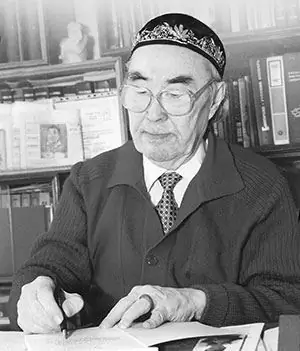
Muzafar Alimbaev's family was very literate. The parents began to teach their three sons very early. So Muzafar read freely at the age of five. When it came time to send him to school, the teachers suggested that the parents enroll the talented child immediately in the second grade. The boy had an excellent memory and knew everything he needed from the first grade curriculum.
First sorrows
Muzafar Abaev became an orphan early. When he was 9 years old, his father passed away. Five years after the death of his father, the boy's mother dies. Muzafar was sent to a boarding school. Despite the harsh living conditions in the boarding school, Muzafar managed to preserve in his soul all the beauty that his beloved parents instilled in him. He began to write poems in memory of the childhood years spent surrounded by his family, friendly fellow villagers. Muzafar's hobby was collecting Kazakh and Russian proverbs. He began to compile a Kazakh-Russian dictionary on his own.
Education
After graduating from high school, the young man enters the pedagogical school of the city of Pavlodar, where teaching was in two languages - Russian and Kazakh. At the school, Muzafar immediately enrolled in a literature circle. Its first publication was published on June 18, 1939. It was a great poem that the young poet dedicated to Maxim Gorky. The poems were published in the Pavlodar newspaper "Kyzyl Tu".
War years
In 1941, the war broke out. The brave Komsomol member Muzafar Alimbaev volunteered for the Red Army. During the war years, he went from an ordinary soldier to a deputy commander. The place of service of Muzafar Alimbaev was a mortar battery of heavy self-propelled guns. At the end of his service, the poet became an officer at the headquarters of a tank unit.
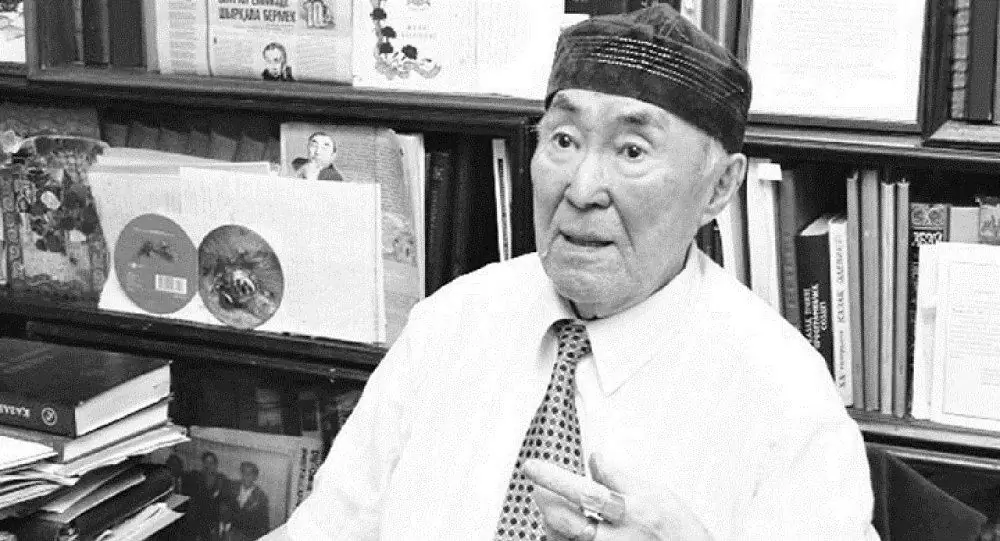
Despite the military hardships, the Kazakh poet does not abandon his poetic creativity. His poetic works were published in periodicals, which were distributed among the soldiers of the Volkhov and Kalinin fronts. Muzafar Alimbaev's poems were also printed on the pages of Kazakhstani newspapers.
The Kazakh poet finished his military service in 1948, becoming a senior lieutenant.
He was waiting for his favorite literary work, which Muzafar decided to do professionally.
Alimbayev's place of work was the editorial office of the Kazakh version of the Pioneer magazine. He worked as an editor and author of a children's magazine until 1958, after which he moved to the position of editor-in-chief of the Baldyrgan magazine, created in 1958. Here Muzafar Alimbaev spent wonderful years filled with creativity.
The poet's creativity and contribution to the cultural heritage
Muzafar Alimbaev is a People's Writer of Kazakhstan. Back in his student years, his poetic works were approved by Gabit Musrepov, to whom Muzafar presented his translations of the works of Alexander Pushkin into Kazakh.
Alimbaev's poetry is light and accessible. He writes about the usual manifestations of life, about his impressions of any subject that fell into the field of his poetic talent. Thanks to the lyricism and melodiousness, the poet's poems easily fit into music. There are more than 200 popular songs written by different composers on the verses of Muzafar Alimbaev.
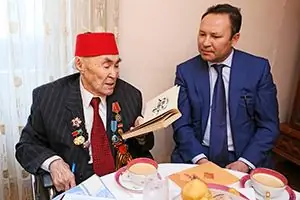
The sublimity of style and respect for the spiritual world of a person allowed him to become a co-author of the Kazakhstan national anthem.
Muzafar Alimbaev was fond of collecting folk proverbs. Moreover, the poet is the author of a huge number of wise aphorisms. Over the years, the author published his proverbs, there are more than three thousand of them. The poet's friends jokingly called Muzafar's apt statements - "muzaforisms".
The author's works received a wide audience - his books were translated into many languages of the Soviet Union. He published several collections of poems not only in Kazakh and Russian, but also in Kyrgyz and Turkmen.
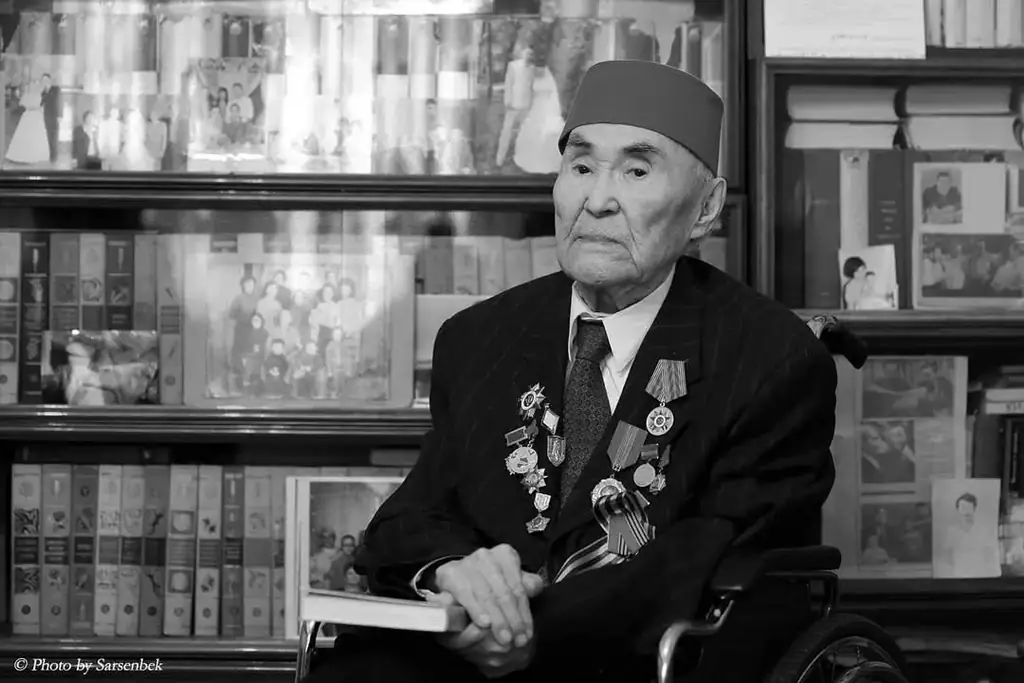
Muzafar Altynbaev was an excellent translator. Pushkin, Lermontov, Isakovsky, Mayakovsky - this is an incomplete list of poets whose poems the Kazakh writer translated into his native language.
In 1978, Muzafar Alimbaev was awarded the title of Honored Worker of Culture of the Kazakh Republic.
Little residents of Kazakhstan still read his wonderful tales. For the collection of fairy tales "Mistress of Airways" the author received the State Prize of the Republic of Kazakhstan.






